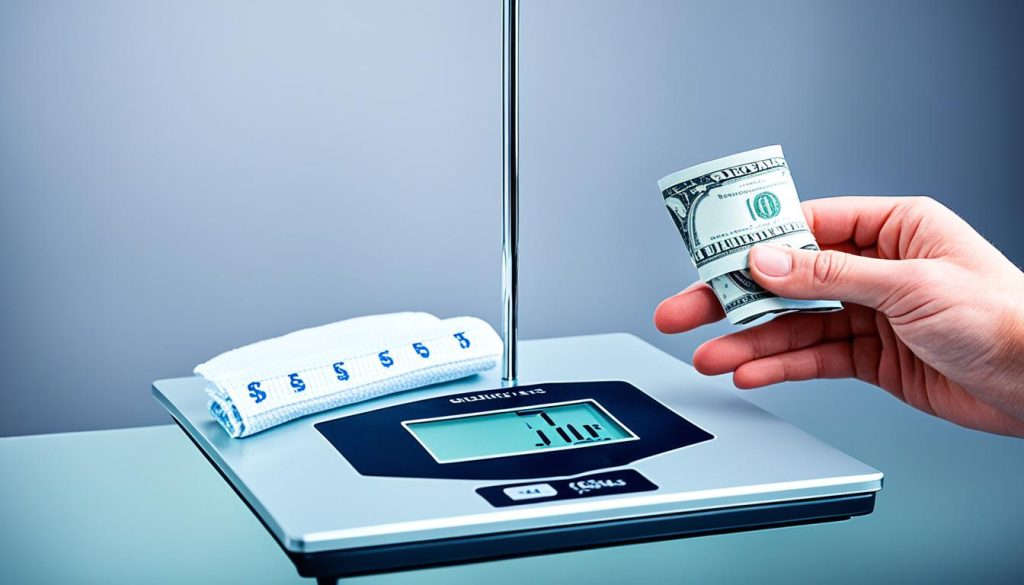Personal injury verdicts often grab headlines, with big jury awards getting lots of attention. But, most personal injury cases settle out of court1. This means they don’t go to trial2. Settlements are usually private because of nondisclosure agreements. They are also often lower than big jury awards you see in the news.
It’s important to know how personal injury settlements work. This is especially true if you’ve been injured and are thinking about a settlement offer.
Key Takeaways
- Most personal injury claims are settled out of court through settlement agreements.
- Initial offers from insurance companies are often much lower than the actual value of damages.
- The value of damages typically increases with the severity of injuries.
- Factors such as liability, medical prognosis, and contributory negligence impact settlement negotiations.
- It is best to consult a lawyer before agreeing to settlement terms.
The Prevalence of Settlements in Personal Injury Claims
Most personal injury cases, about 95-97%, end in settlement, not trial3. This is similar to criminal cases, where over 94% settle out of court4. Settlements can happen at any stage, from before filing a lawsuit to after a verdict.
Statistics on Personal Injury Settlements vs. Trials
Only a small number of personal injury claims go to trial4. Most settle early through negotiation. Settlements are quicker, cheaper, and less risky than trials. Deciding to go to court depends on liability disputes, unsatisfactory offers, and complex legal or medical issues4.
Benefits of Settling Personal Injury Cases
Settling means a guaranteed payout for the plaintiff, avoiding trial risks3. Costs like litigation time, trial prep, expert fees, and appeals affect settlement decisions3.
Trials might offer a bigger payout but come with higher costs and uncertainty4. An experienced lawyer helps decide if a case should settle or go to trial4.
Settlements are common in personal injury claims for their benefits: a sure payout, less time and cost, and avoiding trial risks. Choosing to settle or litigate is complex. It often needs a skilled personal injury lawyer to guide the best outcome for the client345.
How Personal Injury Settlements Work
When you’re in a personal injury case, the settlement process can be complex. It’s all about negotiating between your lawyer and the other side, often with insurance companies6.
Your lawyer will have a specific settlement amount in mind. This is based on things like future costs, lost wages, damage to property, loss of companionship, and medical bills6. Insurance companies will offer their own settlement amounts, and your lawyer might ask for the full policy limit to get the best deal6.
The negotiation is a back-and-forth of offers and counteroffers. Your lawyer will push for a higher amount, while the insurance company tries to pay less7. Skilled personal injury lawyers are key here. They use their legal knowledge, negotiation skills, and your case details to fight for the best outcome for you6.
The Negotiation Process
Negotiations can take time and might even end up in court6. Your lawyer might start with a higher offer than the insurance company’s first one, but still less than what they asked for6. If talks stall, mediation might be considered before going to trial7.
Factors Influencing Settlement Amounts
Many things affect how much you might get in a settlement. This includes how bad your injuries are, how they affect your life and work, the cost and length of your treatment, and the emotional and mental harm you’ve suffered6. Your lawyer will collect medical records, expert opinions, accident reports, and witness statements to support your claim7.
Good personal injury lawyers also think about future costs, lost earnings, pain, and possible future problems when figuring out your claim’s value7. They use legal examples and their knowledge of injury law to help your case during negotiations7. The insurance company might talk about the policy, who was at fault, how bad the injury is, and the medical care you’ve had during negotiations8.
Insurance companies might try to delay negotiations to get you to accept a low offer quickly8. But working with a skilled personal injury lawyer can help you get a better offer. They know how to stay patient and keep pushing for what you deserve8.

When you and the insurance adjuster agree on a settlement, you’ll get details like how much you’ll get for different things, when you’ll get paid, and other important terms6.
“Working with experienced lawyers like the Disparti Law Group Accident & Injury Lawyers, P.A., can make negotiations better and help you get a fair settlement.”8
settlement offers, personal injury, legal negotiation
Settlement offers are key in personal injury claims during legal talks9. Insurance adjusters start with a low offer to see how much claimants know and how patient they are9. But, they might offer a fair initial deal, asking for a slightly lower counteroffer to show they’re open to compromise9.
Dealing with settlement talks can take weeks or even months10. Most personal injury cases settle out of court because it saves time and money10. Trying to negotiate with insurance adjusters by yourself might lead to offers that are too low, leaving you shortchanged10.
11 Negotiations in personal injury cases can go on and end at any time11. Both sides share their views on the claim’s strengths and weaknesses before agreeing on a settlement11. Don’t accept the first offer right away; it might be a test of your knowledge. Negotiating can help you get a fair deal11.
9 Don’t lower your demand more than once without getting a better offer from the adjuster; it’s bad bargaining9. Hiring a personal injury lawyer is wise if the claim is for serious injuries or future costs, or if there’s a dispute over who was at fault911. A reservation of rights letter means the claim is being checked and doesn’t mean you’ll get paid if the incident isn’t covered11.
9 Emotional factors like injury photos or the other driver’s alcohol use can make insurance companies more likely to settle911. Highlighting emotional aspects like fault, pain, medical costs, and long-term effects can sway the insurance to offer a fair deal119. Always confirm the settlement in writing to avoid future disputes911. Writing down the settlement agreement confirms the terms and when you’ll get paid11. If the insurance company isn’t serious or you’re unsure about handling it alone, getting help from a personal injury lawyer is a good idea for a fair result11.

Evaluating Personal Injury Settlement Offers
When you get a personal injury settlement offer, it’s key to check if it’s fair and enough. Look at the main amount, what it covers, and any legal terms like confidentiality clauses12. Having a skilled personal injury lawyer is a big help. They know the case’s strengths, the evidence value, and what courts usually decide12.
Assessing the Fairness of an Offer
Your lawyer makes sure the offer is fair and reasonable, considering the risks and costs of going to court12. They look at how the main amount compares to your total claim12. They also check the mix of direct costs (like medical bills and lost wages) and indirect costs (like pain and suffering)12. They’ll also look at any confidentiality clauses and if the offer covers all future medical costs12.
The Role of Legal Representation
Talking to a personal injury lawyer is key for handling settlement talks12. They give you insights on your case’s strengths and what might happen in court12. With their negotiation skills, they can aim for a better offer. This way, you get fair pay for your injuries and losses12.
With a lawyer’s help, you can make a smart choice that looks out for your best interests and gets you a fair deal12.

Comparing Settlements to Trial Outcomes
When dealing with a personal injury claim, you must weigh the pros and cons of settling versus going to trial13. Settling usually means a quicker resolution, saving time and reducing stress13. It also means knowing exactly how much you’ll get, which helps with financial planning13. Plus, settlements keep the details private, so you don’t have to share your settlement with others13.
Risk Assessment for Trial
But deciding to go to trial is a big decision13. Trials can be costly because of legal fees and other expenses13. They also take a long time, sometimes years, based on how complex the case is13. And, the outcome is not certain, as it depends on the judge or jury13. So, it’s crucial to look at your case’s strength and evidence before choosing to settle or go to trial13.
Potential Outcomes of Litigation
Trials might offer the chance for higher compensation, but they also come with risks14. Settlements might mean getting less money than you could in a trial, but they offer certainty and control over the outcome14. Sometimes, settlements might not be fair, leaving you with less money than you could have gotten in court14.
Choosing between a settlement and a trial requires a deep look at your case, the possible compensation, and the costs of going to court15. Settling usually means getting money faster than going to court15. It also saves on legal and court costs15. But, settlements might not be as high as what a jury could award15. Trials can take a long time, but they could lead to bigger awards, including punitive damages in some cases15. The result of a trial is not guaranteed, and you might get less than the settlement offer or even lose15.
By thinking through these points, you can make a smart choice between settling or going to trial, aiming for the best outcome for your case131415.
Considering Financial and Emotional Factors
When looking at personal injury settlement offers, it’s key to think about both financial and emotional factors16. You need to figure out the costs like medical bills, lost wages, and future care needs17. Also, don’t forget to include the costs of pain, suffering, and emotional distress, as they matter a lot17.
Think about when you might get the money, too. Getting it right away can help with bills but might not cover everything you’ll need in the future18. It’s important to think about how getting money later could affect you financially and emotionally18.
Personal injury lawyers must look at the financial impact of a settlement, like lost wages and medical bills16. They also need to think about the emotional factors, like pain, how the injury changed your life, and its long-term effects on your mind17.
By looking at both sides, personal injury settlements can help people recover and start anew18.
“Settlements in personal injury cases are reached without going to trial, benefiting both the injured party (plaintiff) and the defendant by avoiding costs and uncertainties associated with trials.”18
Settling personal injury cases is a tricky process. It’s about balancing what the injured person needs and what the other side can accept16. With a good lawyer, you can make sure all the important factors, both money-wise and emotionally, are considered when looking at an offer18.
| Factors Influencing Personal Injury Settlements | Description |
|---|---|
| Medical Expenses | Current and future medical costs, including hospitalization, rehabilitation, and ongoing care. |
| Lost Wages | Compensation for income lost due to the inability to work during recovery or long-term disability. |
| Pain and Suffering | Non-economic damages for the physical and emotional distress caused by the injury. |
| Long-Term Impact | Consideration of the lasting effects of the injury on the plaintiff’s quality of life and future earning potential. |
By carefully looking at both the financial impact and the emotional factors in a personal injury settlement, both the plaintiff and their lawyer can aim for a fair and complete solution161718.
Conclusion
Understanding personal injury settlements is key if you’ve been hurt by someone else’s mistake. Most cases end in settlements, not court fights, giving victims a sure payout19. But, it’s important to think about the strength of your case, the possible court outcomes, and the financial and emotional effects20.
Getting help from a skilled personal injury lawyer is vital. They know how to deal with insurance companies and plan for your needs now and later20. They also know how to present evidence and figure out a fair settlement amount, including money for medical bills and lost wages20.
By learning about the settlement process and working with a good lawyer, you can get a fair settlement that fits your situation19. This way, you can pay for your medical bills and lost wages and feel better emotionally20. Putting your health and getting a fair settlement first helps you move on with peace and closure.
FAQ
What is the prevalence of settlements in personal injury cases?
Most personal injury cases, about 95-97%, settle out of court. This is similar to criminal cases, where over 94% are plea bargained. This shows how common settlements are in legal disputes.
What are the benefits of settling personal injury cases?
Settling means the plaintiff gets a guaranteed payout. It avoids the risk of a trial, where success is only about 50% likely.
How does the personal injury settlement process work?
The process involves negotiations between the plaintiff’s and defendant’s lawyers. Insurance companies are often part of these talks. The settlement amount depends on the injury severity, daily life and work impact, medical costs, emotional damages, liability certainty, and litigation costs and time.
What factors should be considered when evaluating a personal injury settlement offer?
Look at the offer’s principal amount, what it covers, and any legal terms. An experienced attorney can help by offering insights into your case’s strength and evidence reliability.
How do you compare settlement offers to the potential outcomes of a trial?
Assessing the risk and possible trial outcomes is key. Consider your case’s strength, witness and evidence reliability, and the unpredictability of jury verdicts. These can be higher or lower than the settlement offer.
What financial and emotional factors should be considered when evaluating a personal injury settlement offer?
Calculate all financial damages like medical costs, lost wages, and future care needs. Don’t forget to include pain, suffering, and emotional distress. Think about when you’ll get the settlement, as it affects long-term financial security.
Source Links
- Personal Injury Settlement Agreements Explained
- Understanding Negotiation in Personal Injury Cases
- Settlement Offers and Personal Injury: Identifying the Break-Even Offer
- Personal Injury Trials – How Often,They Go To Court | Daly & Black, P.C.
- Factors That Affect Settlement Amounts in Personal Injury Claims in Pennsylvania
- Negotiating Process in Personal Injury | Adam S. Kutner, Injury Attorneys
- How a Personal Injury Settlement is Negotiated
- How Do Personal Injury Attorneys Negotiate Settlements? | Disparti Law Group
- Tips for Getting the Best Personal Injury Settlement
- How Long Do Cases Take to Settle? | George Sink Injury Lawyers
- Tips for Negotiating an Injury Settlement With an Insurance Company
- How Do I Know If I Have a Good Settlement Offer? Evaluating Fairness in Personal Injury Cases – Compass Law Group, LLP Injury and Accident Attorneys
- Comparing Settlements vs. Going to Trial in Personal Injury Cases – Northern California Personal Injury Lawyer | Law Offices of J.Chrisp
- The Pros and Cons of Settling vs. Going to Trial in a Personal Injury Case –
- Comparing Personal Injury Settlements vs. Court Verdicts – NTZ Law
- Negotiate Maximum Settlements With The Best Strategy
- Common Factors That Affect A Personal Injury Case
- Tips in Negotiating Settlements in Personal Injury Cases
- What to Expect in a Personal Injury Settlement Negotiation
- How Lawyers Negotiate Settlements

